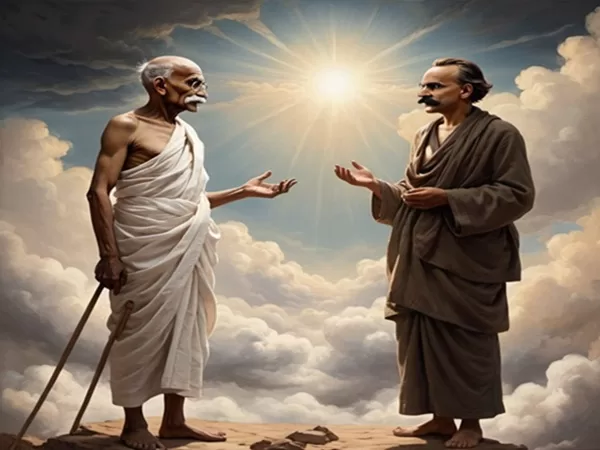By Danish Zahoor in The Geopolitics
Turn the other cheek, was Gandhi’s call. One of the abhorrently controversial pieces of advice to carry out politics during the tumult of the Second World War. While Hitler’s forces were ravaging large swathes of Europe, this meek old man continued to hold on to his non-violent flag. For him, the ends did not justify the means. Both means and ends ought to be moral. When he suggested to the then Viceroy of India to tackle Hitler with soul-force alone, he left him aghast at his seeming disconnect or dyslexia of the situation. And yet, he wasn’t alone. Always tailed by a massive following, he had already achieved a celebrity that has only been the privilege of saints in India. He had ascended way above the league of the run-of-the-mill politician into the rarefied air of Indian public life.
Could politics and morality go hand in hand though? Was Gandhi living in a fool’s paradise when he suggested turning the other cheek to the fiercest marauder of the century? Did morality have any utility beyond good lip service in politics?
In late medieval Italy, Niccolo Machiavelli wrote a highly controversial treatise –– The Prince –– which forever divorced the realm of politics from that of morality. It convinced many a ruler of the futility of upholding moral virtues in their political dealings. The moral standards of the prince were different from that of the public, he argued. The Prince must lie, deceive, kill, spy and do whatever else it takes to hold on to power and to expand it! This resonated well with some of the most brutal monarchs of the gory medieval times and in a way consoled them for their dealings. The acts that would have put them to shame thus far (given the background of Christian theology) now received philosophical approval of sorts. It made these acts seem merely like a distasteful but necessary modus operandi to carry out the burdensome duties of statecraft. Their guilt in their dealings was ameliorated and their sense of justice was bolstered.
However, Machiavelli’s political philosophy of ignoring ordinary morality is summarily rejected by what transpires in our reading of history. Let’s take the example of one of the most definitive events of modern history –– The French Revolution. It was carried on the wings of the so-called “reign of terror” which began by violently wiping out the French establishment including the monarch and the queen. The revolution was fanned by the Jacobins, spearheaded by the rabble-rousing Maximilien Robespierre. The indiscriminate violence shocked the sensibilities of most European onlookers and was reminiscent of the continent’s brutal medieval past. Around 17000 were summarily executed often on the basis of suspicion. It left an indelible mark on French history. The republic was established, but the French Revolution did not culminate before completing a full circle. The violence eventually boomeranged on the very protagonists of the revolution and ended in the brutal massacre of many Jacobins including Maximilien Robespierre himself.
In our own times, another case worth considering is the American experience of fighting the Soviet forces in Afghanistan using a proxy group called the Mujahideen. The Mujahideen became a potent force to defeat the Soviets and some even attribute Soviet Union’s ultimate downfall to the loss in Afghanistan. However, eventually, the Mujahideen metamorphosed into a dreaded global terrorist force and became America’s bête noire of the century. Under a different brand, they carried out one of the most defining attacks on the United States rattling its foundations and marking the beginning of its end as the singular superpower of the world.
Pakistan’s Chronic Chaos – Invisiblites
Likewise, when Pakistan began to use mercenary militant groups in an attempt to ‘bleed India by a thousand cuts’, little had they expected its fallout on their own country. In an attempt to weaken India, Pakistan had to create an extraordinary capability for violence in terms of personnel, weaponry, infrastructure and intelligence. Having such a sophisticated in-house apparatus of violence was always risky. In Pakistan’s case, it turned into a political nightmare as this apparatus undermined its civilian political system. Any attempt to rid itself of the radicalised elements was met with sharp retribution through violent means, shockingly indiscriminate and inhumane. Serial bomb blasts in mosques and markets, kidnappings and assassinations, and suicide attacks almost became the order of the day in the country. They had created a Frankenstein that they could no longer deal with.
“Whoever fights monsters should see to it that in the process he does not become a monster. And when you look long into an abyss, the abyss also looks into you”. This aphorism by Frederich Nietzsche captures the collective behaviour of human societies perfectly well. When we fight through violent or immoral means, we as societies invest in and create a complex apparatus of its means. We create in ourselves the same forces that we abhor in others and had originally set out to fight. By fighting them using the same immoral means, we are setting new standards of political behaviour and proclaiming its acceptability. It is only about time, that with a little shift in the political landscape, the same forces would rebound and turn on their very progenitor.
This somewhat explains the mechanics of the Hindu philosophy of ‘Karma’ that deeply informed Gandhi’s outlook. A broad view of history today, absolves Gandhi of the seeming fancifulness of his ideas. In fact, the meek Gandhi and the melancholic Nietzsche are proven to be much more far-sighted political philosophers than the glamorous Machiavelli. Machiavelli may win us tactical battles but Gandhi and Nietzsche create a humane and liveable world that lasts. Divorcing morality from politics is a great travesty. Morality, in fact, will forever be the broth in which the recipe of politics is cooked.
This article was originally published in The Geopolitics. Photo created using Openart.ai
